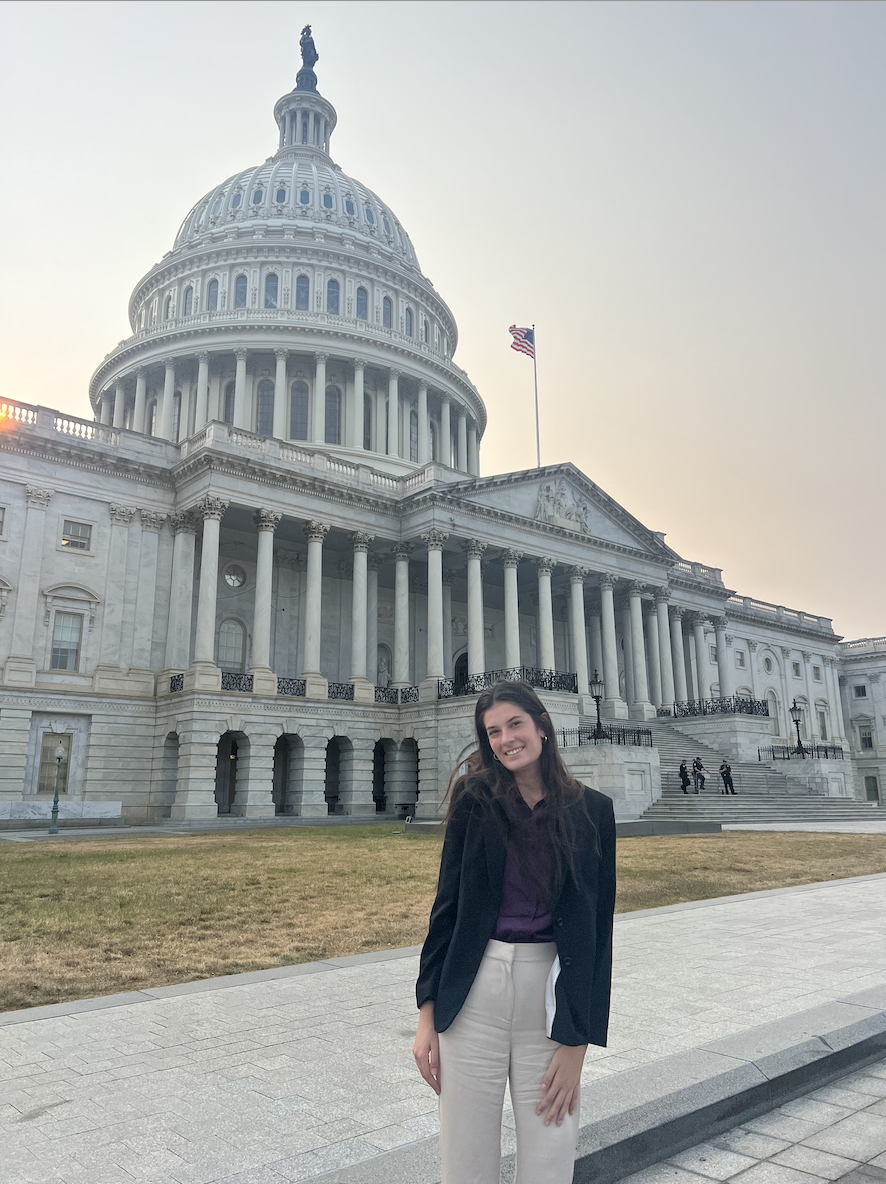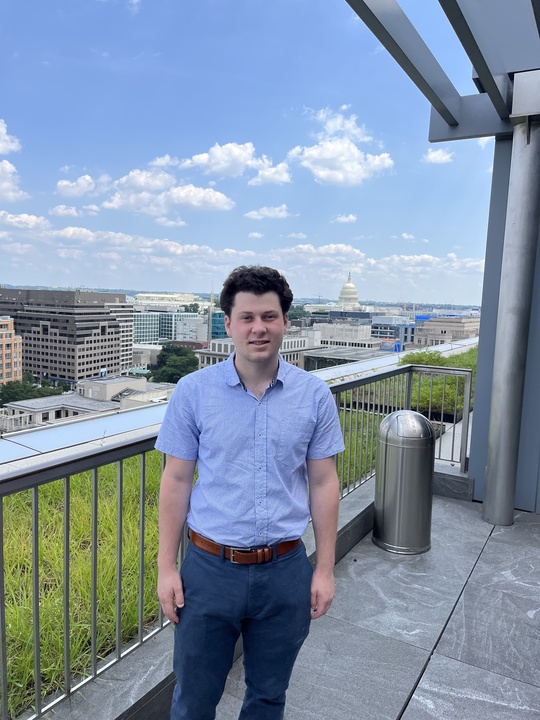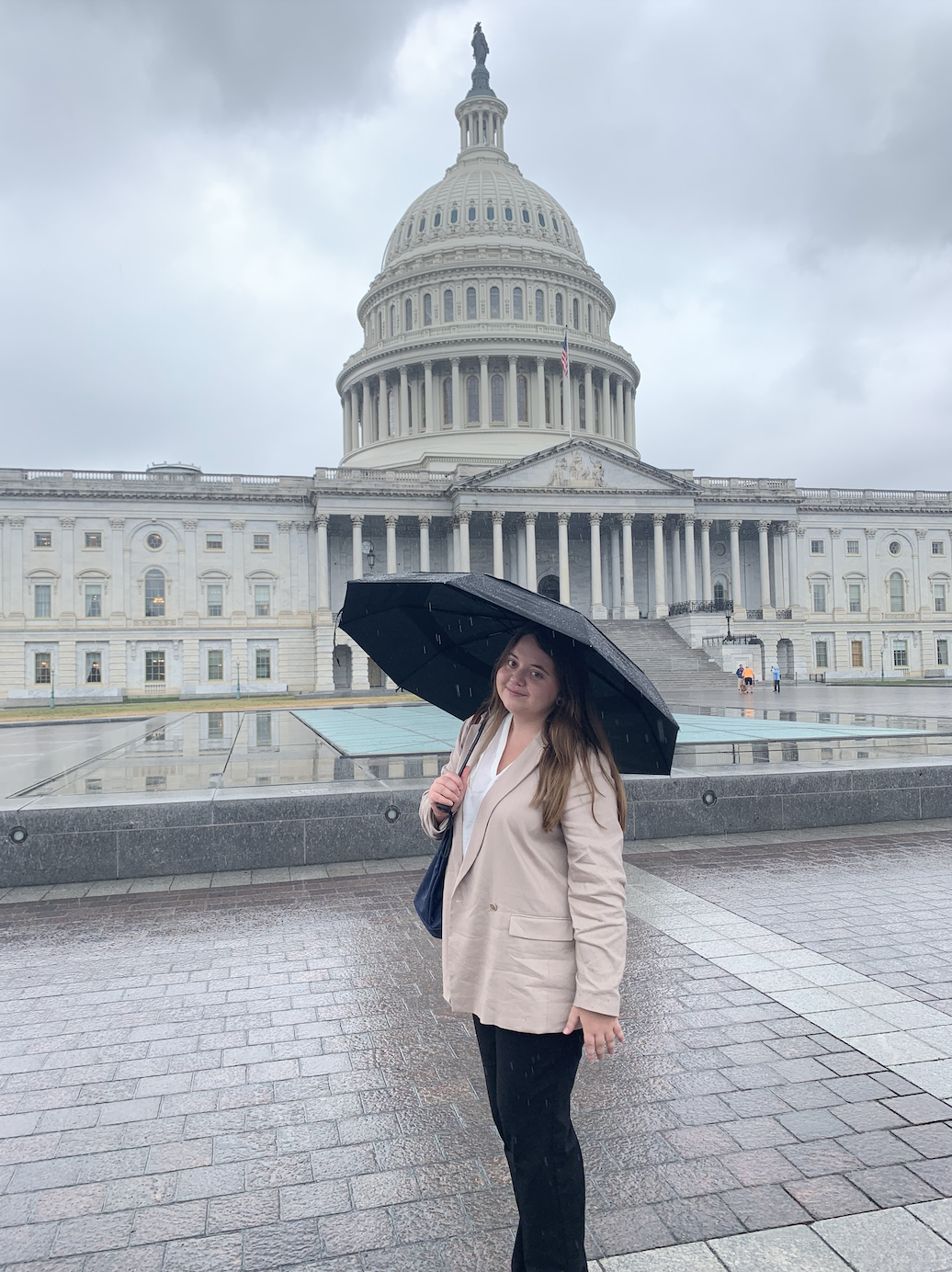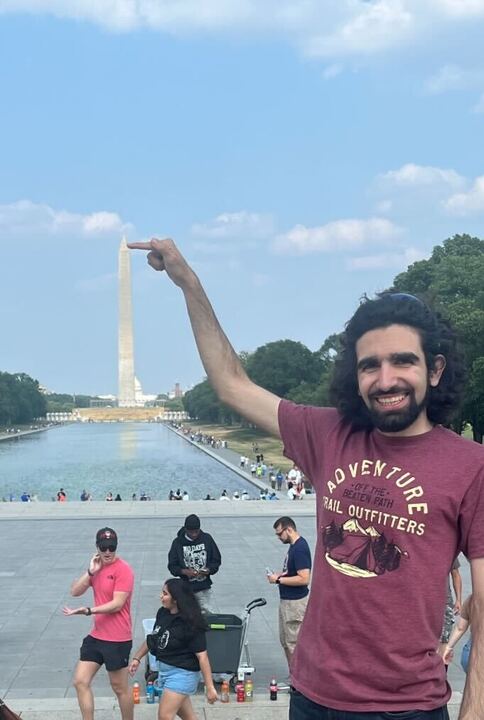Q&A with our 2023 Summer Interns!
We asked our summer interns to answer some questions regarding the 2023 Congressional App Challenge and their experiences working at the Internet Education Foundation. Make sure to click on the links and images below to learn more about past App Challenge winners and our interns!
1) Why did you decide to intern with the Congressional App Challenge this summer?
Brynn Baker:
“I have always been incredibly passionate about comprehensive education access advocacy. When I was younger, I led a club at my high school that raised awareness for various issues that impact female education access on a global level. When I heard about the Congressional App challenge, and all of the work that it does to equalize, and diversify the fields of STEM and computer science on a national scale, I knew that an internship there would be an amazing opportunity. As I navigate my interest in public policy in the future, I am confident that this experience doing congressional relations work for a bipartisan nonprofit that helps to diversify the computer science field will be invaluable. I am incredibly grateful and enthusiastic about doing work for the Congressional App Challenge this summer in the nation’s capital.”
Gabe Schwartz:
“I decided to intern with the Congressional App Challenge because I wanted to gain data analytics and business experience. Working with a nonprofit organization that works so closely with congress seemed like a great opportunity. I also think the mission of the Congressional App Challenge is super important, and want to help grow the organization to increase STEM education across the country.”
Emma Solomon:
“My interest in the congressional realm has always been rather broad, and when looking for an internship this summer, I wanted to find a niche that allowed me to make a positive impact on the lives of others. As I continued searching for positions, the Congressional App Challenge became the most obvious choice. Although the government is often viewed in a contentious light in this day and age, I feel as though this initiative bridges partisan divides and allows a plethora of representatives to unite under a common goal of uplifting STEM education across the country. I ultimately decided to intern here because it is where I feel hope and the ability to create palpable change.”
David Awakim:
“My interest in the Congressional App Challenge was piqued by the sheer scope of the competition; we’ve spurred the creation of over 4,000 different applications! This inkling of want was fed with desires to provide public service to countless students out there (I know I did not have access to such opportunities, giving me extra appreciation for how formative and frankly fun they can be!), and to participate in a program where I won’t be lost in a storm of interns filing away at torrents of empty bureaucracy. While the positive culture at the organization did not fail to shine through, exploring the website primarily showed me their ability to handle, organize, and unionize all of these disparate competitions despite great variation. After all these fascinations, the last impulse was the good word of some fellow Cal alumni, and it has been just as wonderful as I expected!”
2) Tell us about a Congressional App Challenge app that has caught your attention since beginning your internship.
Gabe Schwartz:
“The app Rhythm Reader created by Michael Ward for Representative Brad Sherman’s 2022 Congressional App Challenge in California’s 30th District is very interesting to me. The app allows users to type rhythms in and play along to see if they are hitting the rhythms right. As a guitar player who sometimes spends hours trying to figure out certain rhythms, I think this app could be useful for me going forward. I have worked to train my ear to better hear different pitches and rhythms. Due to this training and the difficulties of reading sheet music on guitar, it is much easier to learn music by ear than through sheet music. I also will use this app to help me in my journey to start writing my own music. I used to give guitar lessons, and this app could be very helpful in teaching the basics students with no previous musical experience.”
Emma Solomon:
“The app that caught my attention when looking through previous winners was LookUpp; an app created to encourage social interaction. Submitted by Samin Bhan and Atiksh Bhan of Representative David Rouzer’s district, the pair balanced their understanding of behavioral economics and the science of decision-making to create a program that helps society become less reliant on screens. The reason that this app caught my attention is because I find the juxtaposition of using an app to become less reliant on apps really interesting and innovative!”
David Awakim:
“One eye-catching (perhaps literally) app is Mela-No-More by Harita Suresh and Sharada Suresh, winners of the 2022 Congressional App Challenge in New Jersey’s 8th district! The basic premise is to use supervised machine-learning to identify melanoma in a photo and provide auxiliary information to assist the user. I was fascinated by the design of the project, pulling data from several open source libraries like Microsoft Azure and IBM Watson to provide these services, and it shows in the utility of their resultant website: able to analyze photos, provide a personal melanoma risk assessment, and even showing a daily UV index graph! The confidence and the capability to know when to lean on available resources and how to integrate them into a wonderful, aesthetic presentation is commendable, and truly a sign of the future of tech. There are so many tools out there available at our fingertips, lying in wait for someone to shape them to our benefit.”
Brynn Baker:
“One Congressional App Challenge app that caught my attention was the winner from Representative Lee’s district in 2022: Pocket Congress. I think that a constituent holding their representative accountable is a civic duty, and helps maintain functional democracy. Unfortunately, policy can be inaccessible and convoluted, leaving many constituents behind. An app like Pocket Congress helps make politics accessible, and I think it’s a great idea. As someone who is interested in tracking new policy, it is absolutely something I would use, which is why it caught my attention.”
3) If you were still in high school, what kind of app would you like to code for the App Challenge?
Emma Solomon:
“If given the opportunity to participate in the Congressional App Challenge back in either middle or high school, I would want to code an app that could easily help children participating in musical theater practice their music. As kids begin musical theater, there is a great range of those who are able to read music and those who have no experience understanding theater scores. This app would help break down the script and make musical theater more accessible for all who want to become involved! This could be utilized both at home and in-person, so that rehearsing can be an individual and collaborative experience. As a retired musical theater kid, I feel as though this could streamline rehearsals and give the cast more time to become immersed in their characters and the theater experience.”
David Awakim:
“Oooh this one’s quite puzzling, there’s so much potential and too much is possible. With the blessing of hindsight, I’d probably try to make an advanced math calculator. There’s already wonderful websites that show step-by-step processes for solving derivatives and integrals, but as you dive into higher math these sorts of resources dwindle. The support would be incredibly valuable, and having had the exposure and the toolset to construct such applications would expand both my understanding and capacities to explore the subject matter! It may have been as simple as an algebra solver, or it may have touched on complex calculations like knot invariants, p-adic representations, radical reductions, and who knows what else! The extent of the problems it’d be able to solve would really depend on how many rabbit-holes I fall into, but it’s still fascinating to consider what might have been.”
Brynn Baker:
“Since I’ve been here in D.C., I have loved trying new restaurants, sightseeing spots, and monument tours that are unique to D.C. I think that if I were in high school, I would like to code an app that acts as an interactive, virtual bucket list. In each city, there could be a map with pins on restaurants, museums, etc., and it would allow you to accumulate points for each new thing you’ve done, that you can use as coupons at the same spot later. When you leave the city, you can see a count of all of the new places that you’ve tried. I also think it would be a great way to keep track of favorite things to do, in case you return to the same city again one day. I’m not sure if something like this exists, but it’s something that I could see myself getting a lot of use out of!”
Gabe Schwartz:
“If I was still in high school, I would want to code an app that is a hub for college research. When I was applying to colleges it was hard to see from the websites what each school was really like. If there was an app that could compile all the important information about different schools and connect applicants to current students, it would make the college application process significantly easier for high school students.”
4) Outside of the duties of your internship, what has been your favorite part of interning in Washington, DC?
David Awakim:
“From the moment that I landed in D.C. there were three things that I noticed: 1) the food here is amazing, it reminds me of the assortment and strength of flavors that I grew up with back in Brazil. 2) The skyline is beautiful!! It has frankly been my favorite part of being here, walking across random streets looking to the side and seeing the giant Washington Monument piercing through the skies. There was also the pleasant surprise of a beautiful rooftop view at the office, gorgeous sights of the gleaming Capitol dome! But really it is just baffling to be able to walk around and see these grand structures and realize I’m walking the same streets as some of the most influential people. 3) Of course I have to mention that the humidity is absolutely soul-crushing, walking 3 blocks feels like I took a long shift as Atlas; yet it’s worth it!”
Brynn Baker:
I think that my favorite part of interning in Washington D.C. has been the amount of politics and history readily accessible and around every corner. Almost everywhere you go, you will see a historical building or monument, and many of them are within walking distance from one another. I’ve learned a ton of American history in the short time I’ve been here. I also love how community-centric it is here; I’ve been to free outdoor movie nights in public parks with friends, free museum events, farmers markets, and much more. D.C. feels so lively, and it’s so easy to meet passionate people with similar interests.
Gabe Schwartz:
I am originally from Washington, DC, so it has been super nice to explore the city on my own during the internship. The city is more beautiful than I had realized before, and I get a really great view from the office. I have really enjoyed being so close to so many important national landmarks and museums and I always try to stop and not take that for granted. DC is so walkable that it’s very easy to walk around and take in the beauty of the city.
Emma Solomon:
Outside of working, my favorite part of this summer has been acclimating to a new city on my own. I have lived in the Bay Area my entire life and I feel like I have not had the opportunity to explore a brand new space on my own until now. Walking home from work, exploring the Metro and having the ability to sample coffee from across the city has made each day a wonderful experience here in Washington D.C.!




